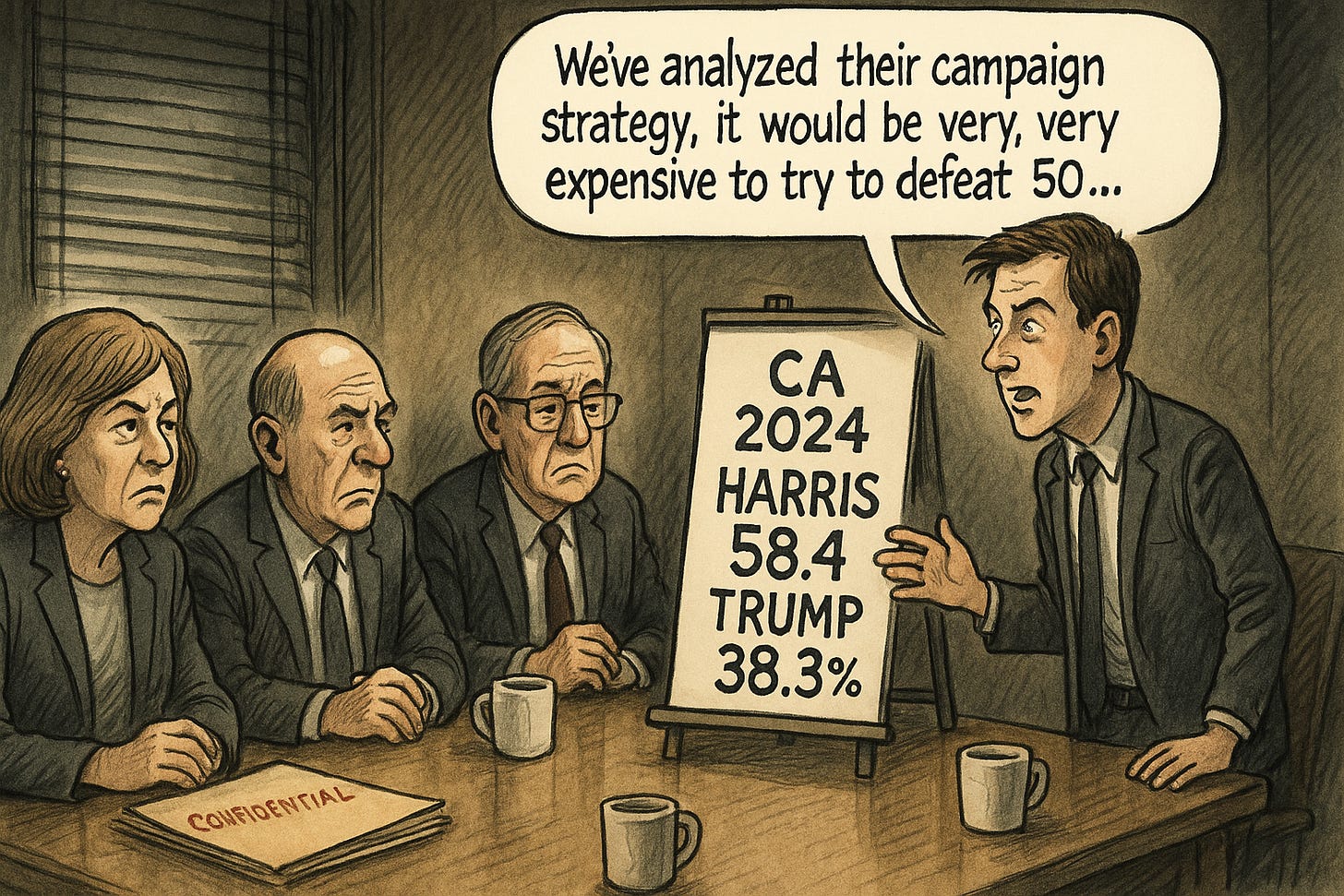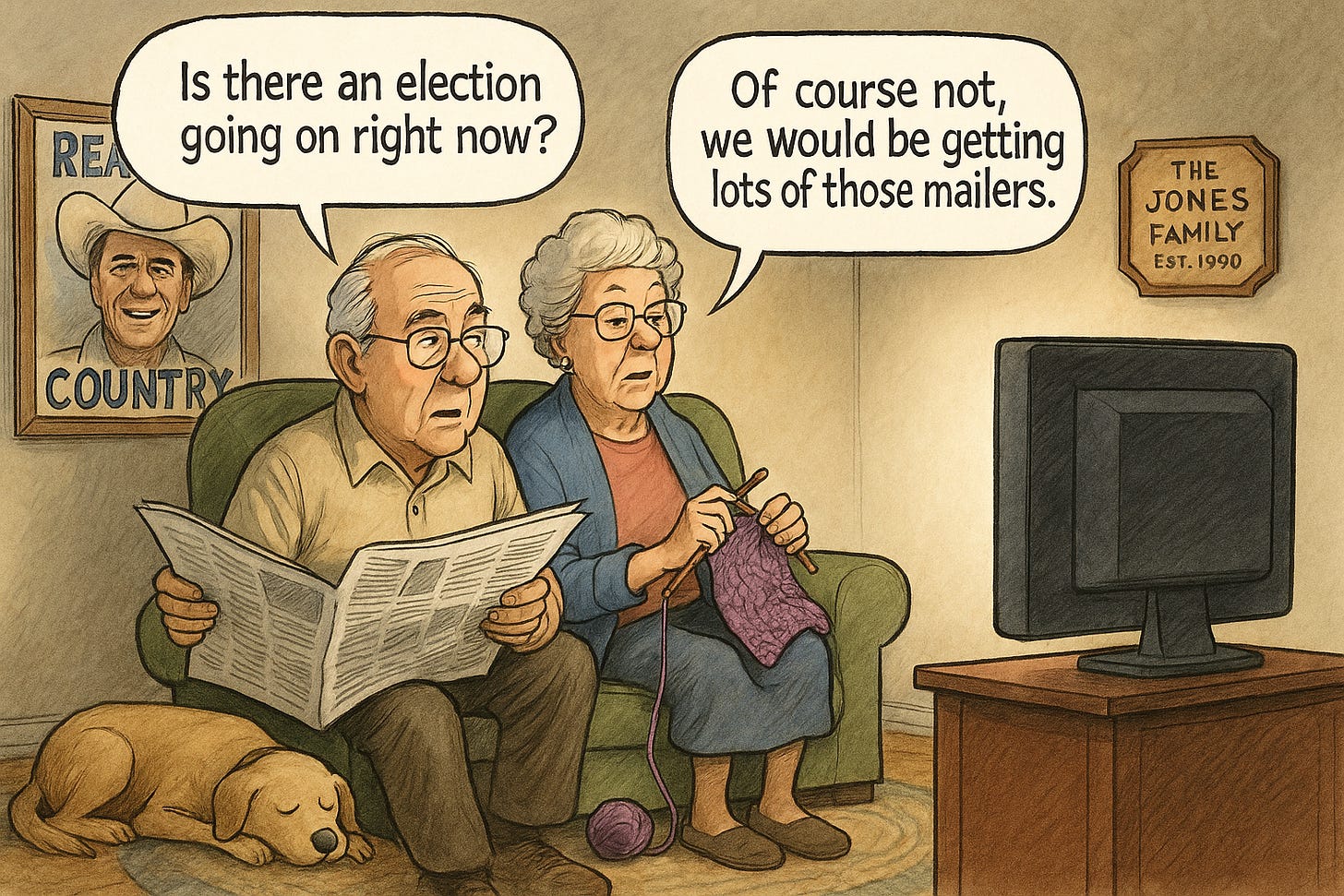Did a Back Room Meeting Far from California Ensure The Passage of Proposition 50?
The disparity of campaign cash between the Yes and No campaigns has created two very different scenarios for likely Republican and Democratic voters…
A Decision In The Dark?
Prop. 50 was placed before voters with a special election called, and shortly thereafter, a meeting would have taken place. On Zoom or in a conference room in Washington, D.C., Experts would have ballparked the chances of defeating the cynical gerrymandering plan, given the shrewd strategy of the Yes side to make the vote a referendum on Trump in a deep-blue state that the President lost by over 20 points. With limited resources and a national map, it’s clear that the price tag to try and take it down would have diverted too many resources away from the fight to hold or pick up other competitive seats around the country.
In the meantime, Newsom has raised vast sums of campaign money from everyone you can think of who relies on state funding or government favor. In fact, on Monday morning, Newsom sent an email out to donors titled, “You can stop donating now. Thank you.” It went on to say, in part: “We have hit our budget goals and raised what we need to pass Proposition 50. You can stop donating…”
GOP-aligned committees would send enough funds to show respect for the Golden State’s nine-member Congressional delegation, and some California-based major donors, but that was it. I assume this is what happened, and that’s life. Those of us who live here and are having this thing done to us—we fight hard against it, campaign hard against it, and pray. A lot of hard work has gone into opposing Prop. 50 up and down the state, and this analysis is not meant to diminish any of it.
The Consequences
The airwaves, mailboxes, and screens of California are buzzing with one-sided noise this election season, since ballots dropped. Whether you hear it depends on who you are and how you’re registered to vote. Proposition 50, a measure that would let politicians pick their voters instead of the other way around, is being propelled by a financial juggernaut on the Yes side, while the No side, for the reasons I mentioned above, is running on fumes. The result? Two households on the same street are living through entirely different elections.
Consider the Smiths and the Joneses, neighbors living across the street from each other. Both households have four voters, but their election experiences couldn’t be more different.
The Smiths are registered Democrats: Mom, Dad, their adult son who still lives at home, and Grandma. Their world is saturated with Yes on 50 messaging. Watching CNN or a late-night show? They’re hit with slick ads laced with anti-Trump rhetoric. Streaming Hulu, YouTube TV, or Netflix? More ads tailored to their household. Their phones, tablets, and computers buzz with texts, emails, and pop-ups urging a Yes vote. Their mailbox overflows, and campaign volunteers knock on their door, reminding them to mail their ballots. For the Smiths, this special election feels like a high-stakes battle. They proudly vote yes and tell their family and friends.
Across the street, the Joneses—four registered Republicans—experience near silence. They received a ballot and voter guide weeks ago, maybe saw a No on 50 mailer or ad, but that’s it. No TV spots interrupt their World Series games, except perhaps a stray Tom Steyer ad. Their streaming services, phones, and mailboxes are quiet.
No one knocks on their door. For the Joneses, this election barely registers. Without campaign outreach, the misleading ballot question language—crafted by Attorney General Rob Bonta (read: a tool of Gavin Newsom)—might mislead them into voting Yes. In fact, a recent Emerson College survey showed 25% of Republicans saying they would vote for Prop. 50.
Communicating To Voters Matters
It has been my good fortune to run successful ballot measures in a dozen states, and I can tell you: voter contact matters. When one side dominates the conversation, it tilts the playing field. The Yes campaign’s financial edge explains much of their lead in public polls. Proposition 50, which would let politicians cherry-pick their voters, is bad policy. As Arnold Schwarzenegger said, “Two wrongs don’t make a right.” There are plenty of reasons to reject it—if they are communicated to voters. But without a robust No campaign, solid arguments against 50 never reach the people who need to hear them.
The Smiths are drowning in campaign noise, while the Joneses barely know an election is happening. Voters deserve better. They deserve a fair fight, where both sides make their case. But a calculated political decision about where not to spend political resources has made Proposition 50’s special election a one-sided affair.




